#like jason and aeson
Explore tagged Tumblr posts
Text
Just finished bbc atlantis and omg im so mad it was canceled but also I think Jason could have solved all of his problems if he had just read percy jackson as a kid
(which seems like such a normal thing to say except he's canonically from 2013/2014 soooooo)
Also the fact that he knows what a computer is and can probably drive a car(and a submarine)and simply never mentioned any of that stuff is batshit insane I'm scared of him
#atlantis bbc#also im sorry the fact his dads name is (spoiler) aeson makes me ugly laugh#like jason and aeson#like u gotta be joking its so funny#rip honestly i was so here for him fucking his cousin
12 notes
·
View notes
Text
i was looking up something about jason on wikipedia and you know that little introductory box?
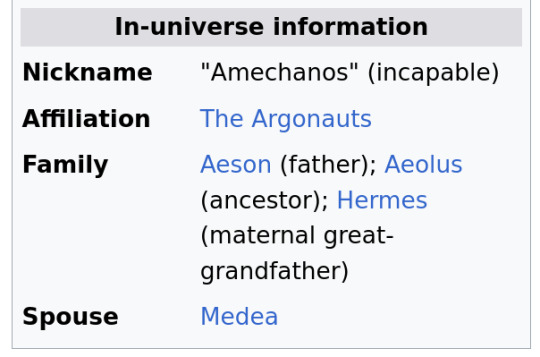
YOU'RE GONNA INTRODUCE HIM AS AMECHANOS FIRST THING?????
#what you need to know about jason son of aeson: 1. he's FUCKING USELESSSSS#i do question simplifying 'epithet' to mean 'nickname' though. they're not like 'HEY! INCAPABLE!' (actually telamon probably would tho)
188 notes
·
View notes
Text
My favourite thing about BBC Atlantis is that they make Jason be from now and time travel back to Atlantis and then? Just? Don’t mention it?
#other than the few times that they have to cos it comes up re aeson#but generally they don’t and it’s such a funny thing to put in#‘oh yeah he was born in atlantis but was taken to the modern world and then ended up in atlantis again and never mentions friends or anythin#from the modern world including food and medicine and gadgets and pop culture’#cos like. jason HAS to have had a life in the modern world doesn’t he? more than just his father#bbc atlantis#atlantis#my own post
80 notes
·
View notes
Text
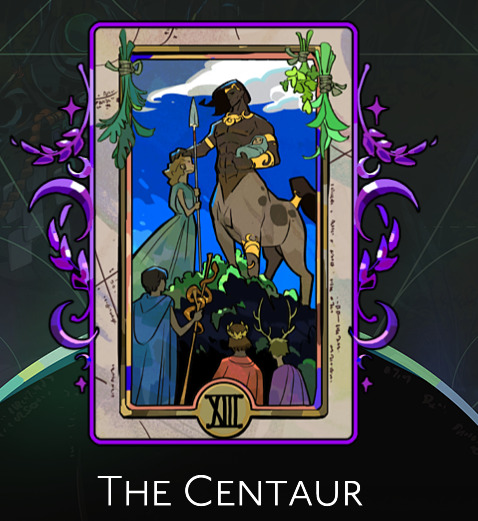
EEEEEEEE Okay so if you’re like me and closely examining every single thing on each of the arcana cards, you’ve probably wondered who all these kiddos are that chiron’s got with him
I’m sure most of us have gathered that the one getting head pats is achilles, considering he’s got curly blond hair, wearing green and holding a spear. But who are the others? And whose baby is that???
Well wonder no more! Hopefully! If I’m right! Because a quick look at a short list of chiron’s apprentices on wikipedia has provided me answers! (This ended up being incredibly long-winded I apologize in advance)
Let’s start at the bottom from left to right. On the far left we a boy draped in blue and holding a staff, a bronze snake wrapped around it. If you know anything about the origin of medical symbols you’ll know that this is asclepius and his famous rod (ha) that, at some point in history, got mistaken for hermes’ caduceus. Thus that’s why it’s the caduceus and not the rod of asclepius we see on hospitals and stuff. But I digress!
Asclepius is the god of medicine and the son of apollo, who was trained in the art of medicine by chiron. So it makes sense why he’s here!
In the middle we have a boy clad in red and wearing golden laurels. I believe that this could be jason of argonaut fame. Long story short, jason’s uncle pelias overthrew his half-brother aeson (jason’s father) and killed all his descendants. Alcimede, jason’s mother, saved her newborn son by having the nursemaids cry over him as if her were stillborn. She then managed to sneak away and give jason to chiron, who raised and trained him. Eventually jason does who whole golden fleece thing and becomes the king of iolcus, though he and medea were quickly exiled afterwards.
On the far right we see a boy clearing purple with deer antlers on his head. If you’re a big artemis fan like me you’ll recognize this guy pretty easily. This is actaeon, a theban hero trained by chiron who’s most famous for earning the wrath of artemis. While out hunting one day he came across the goddess and her nymphs bathing, instead of minding his damn business he decides to peep on her. Rightfully enraged, artemis curses him and forbade him from speaking another word, lest he be transformed. Upon hearing his hunting party he calls out (in some versions he tries whistling for his dogs) and he transforms into a stag. His hunting party finds him, and, seeing a stag in his place, his own dogs tear him a part and kill him.
FINALLY, we have the newborn baby chiron is holding. Now, chiron does have a few children of his own, so it’s possible it could be any one of them. But I think instead it’s a lad named medus, or polyxenus, or medeus it really depends. He’s the son of jason and medea, and like his father, he was also trained by chiron. But honestly that baby could be anyone lmao
Oh god I yapped on for more than I should have WHOOPS 😭 I hope you all enjoyed this quick mythology lesson lol
#welcome back to hades yap sesh with ya boy lobz#yes im very normal about chiron why do you ask#ouhfgghhfhghhh supergiant games I am constantly impressed by how much attention to detail you give to everything#like you can really tell that they actually give a shit about greek mythology and do their research and all the good stuff#while still telling an original story no less#I will always glaze sgg forever and ever#hades 2#hades ii#hades 2 spoilers#chiron
189 notes
·
View notes
Text
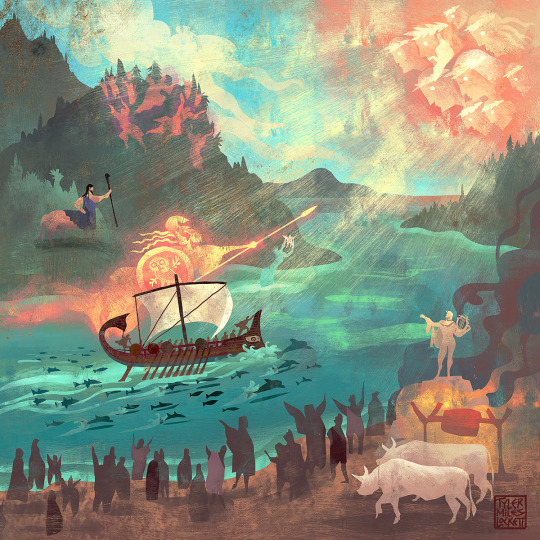
Book 1 of Argonautica begins with an invocation to Apollo and reference to a dark prophecy. King Pelias of Iolchus, (son of Poseidon and tyro), having usurped the throne from his half-brother, Aeson, is prophesied to be killed by a man wearing one sandal. When Jason, “son of Aeson,” arrives wearing one sandal at a court feast honoring the gods, (but neglecting Hera) Pelias devises a deadly quest for the hero to retrieve the fabled Golden Fleece.
Argus, builds the great ship Argo with Athena’s guidance, who incorporates a piece of magical Dodonan oak, giving the wood keel the power of speech. Next, a lengthy list of the heroes and their family lineages is listed by Apollonius. At the shore, the gathered heroes, “shone like starlight between clouds,” (Poochigian). Needing a leader, Heracles suggests Jason, and the crew assents. They construct a beach shrine of stones and offer bull sacrifices to Apollo for a safe journey. That night over wine, an argument almost leads to blows in camp, but Orpheus calms the tensions with a lyre song about the primordial titans.
As the group sets out the following day the demigod and mortal heroes are looked upon favorably from the gods in Olympus, Mountain nymphs of Pelion, Chiron the centaur, with wife holding up infant Achilles, so the hero Peleus could see his son one last time. Orpheus plays a hymn to Artemis while fish leap about the ship’s wake.
After passing more landmarks such as Meliboea, the slanted city of Homola, Olympus, the Pallenean cliffs, and the Thracian Mountain of Athos, they row for the island of Lemnos, a place where the all-women society hold a dark secret.
Thanks for looking and reading! if you share this image ill be sure to sacrifice some sweets into my stomach for you during this holiday! xoxo
Want to own a book jam packed with over 130 illustrations like this? Support my kickstarter for my book "lockett Illustrated: Greek Gods and Heroes" coming in October.
https://www.kickstarter.com/projects/tylermileslockett/lockett-illustrated-greek-gods-and-heroes
#pagan#hellenism#greek mythology#tagamemnon#mythology tag#percyjackson#dark academia#greek#greekmyths#classical literature#percy jackon and the olympians#pjo#homer#iliad#classics#mythologyart#art#artists on tumblr#odyssey#literature#ancientworld#ancienthistory#ancient civilizations#ancientgreece#olympians#greekgods#zeus#hesiod
175 notes
·
View notes
Note
Thought on medus? His relationship with his mom? His age? His time imprisoned? The whole thing give me all of your thoughts and do not spill
took me a second to respond to this ask but I DO HAVE SO MANY THOUGHTS ABOUT MEDUS. how did you know.
He is so momma's boy coded I'm sorry. That man is JUST like his mother. They basically came up with the exact same lie to Perses just in reverse. The exact same ruse. As well as the idea that he followed her willingly after her exile from Athens + I'm partial to the interpretation that he named Media after his mother. So to me I read them as having been fairly close !
Age wise. Uhm. There's no untangling anything related to the argonautica to me I'm sorry. The Greek myths have no true timeline and the heroes' ages are elusive and ill-defined by nature. But if I had to guess I would place him as likely being 16-17 at the time of Medea's exile. Still fairly young.
Medus is really interesting to me as a character despite information about him being very. Sparse. In a lot of ways it almost feels like he sort of inverts a lot of the traits of a typical Greek hero. His father is almost entirely irrelevant to his story. He isn't later compelled to take revenge on Aegaeus or kill Theseus for the throne of Athens (think Jason/Pelias or Pelias/Aeson). After he leaves Athens, he's completely uninvolved with his father or his father's line. Instead, his story focuses entirely on his mother's line. He's named after his mother. In a lot of ways he's a hero who's story is entirely defined by his relationship with his mother. Aside from maybe Achilles it's not something I can recall many examples of.
Like. Okay I know I've mentioned in the past that part of what makes Medea's decision to kill her kids compelling to me is the interpretation of her deciding to do it, in part, to spare them from the cycle of tragedy stemming from the glory-seeking, patriarchal society of Greece (They must die/and since they must/I who gave them birth will kill them). Her children are the sons of a hero, and as all sons of a hero are bound to do, they will suffer for their father's glory. Contrasting that with Medus. How his life is so obviously centered on her. It feels like a reversal.
They're both very interesting to me if you could not tell
#txt#munitalks#medea#medea of colchis#medus#argonautica#apollodorus#euripides#I'm pulling from several different sources for this#just related to my personal interpretation of medea and medus#there's a bunch of different variations to her story post argonautica and this is somewhere in the middle of that I suppose#also this post is NOT me saying Medea did nothing wrong btw#she's a deeply flawed and nuanced character#and i love her dearly#tagamemnon#greek mythology#greek classics
18 notes
·
View notes
Text
The myth of Medea (1)
As I went across the various Dictionaries of Myths I talked to you about, I noticed quite a number of Medea-related articles. So, let’s begin with an article about the “Antique Medea”, written by Alain Moreau. As usual, loosely translated by me.
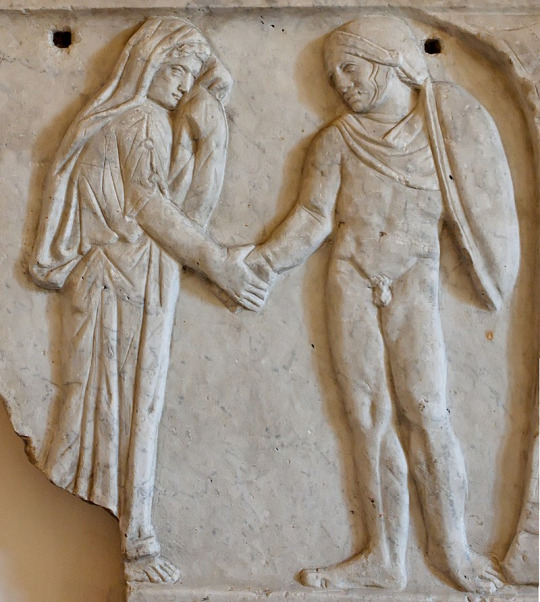
I/ Positive beginnings
A dreaded sorceress and a bloodthirsty killer: those are the two traits that have been imposed on any depiction of Medea, and that for a very long time. To be precise, this portrait can be dated back to Euripides’ Medea in 431 BCE. It might surprise one to discover that it was not always the case, and that the original Medea might have been a benevolent goddess. As often in mythology, the name reveals (or betrays) the origins: Medea’s name seems to be formed of the Indo-European root “med”, which split in modern language in two domains, the one of “meditation” and the one of “medicine”. This etymological origin is reflected in the myth, as Medea prepares all sorts of medicine and remedies – it is with them that, during her stay in Thebes, she healed Herakles who had just murdered his own children after being cursed with madness by Hera. She is also depicted as having the power of rejuvenating the old Aeson, Jason’s father, as well as giving back youth to Jason himself and to the Hyades, the nurses of Dionysos. It is also her who, in Colchis, covers Jason’s body with an herbal ointment which protects him from the deadly fire blown by the bulls of Aietes (the herb used was the legendary “prometheion”, which appeared on the slopes of Caucasus from the blood of Prometheus which falls to the ground each time Zeus’ eagle comes to eat the Titan’s liver). Considering all of this, it is very likely that Medea was originally one of the manifestations or avatar of the great Mother-Goddesses that were once honored throughout Greece and the Near-East, in the image of Cybele, Gaia, Rhea or Demeter. It is not a surprise, according to this reading, that one day she gains for a paredra a male god of smaller importance, “Iasôn”, Jason, whose name is linked to the verb “iaomai” (to heal), to the character of Iasô, a goddess of health daughter of Asklepios, and to the term “iatros”, a doctor, a term still found today with terms such as “psychiatrist” or “pediatrist”.
Up until this point all is good. In the second stage of her evolution, Medea stays a benevolent character, but the goddess leaves the context of religion (and thus a static and synchronic state) to enter a “chronical” state, the one of a tale inscribed in time, the one of the legend and the myth. She becomes a helper, an auxiliary, who helps the hero to perform what seems to be impossible deeds. Thanks to her, Jason dominates the fire-breathing bulls, kills the giants born out of the ground, becomes the owner of the Golden Fleece, escapes Aietes’ ships. According to Hesiode, it is thanks to her, thanks to his new wife, thanks to the “virgin with glittering eyes” that Jason could return to Iolkos safe and happy. Still according to Hesiode, once back to Jason’s homeland she gave him a son, Medeios, who was raised by Chiron in the mountains ; and all of this was part “of the plan of the Great Zeus”. Reading these lines, one can hear the ending of a fairytale: “They married, had many children, and lived happily ever after”. With the slight nuance that Hesiod claims they only had one son.
Things however were already starting to look dark. Because in this tale, we recognize a folkloric motif: the hero of the folktales must triumph of the traps laid before him with the help of a princess. However this theme is deeply linked to another fairytale motif: “the hero is helped by the devil’s daughter”. Aietes, indeed, is a being of the Otherworld. He is the master of Aia, “the land”, a nameless land, located far away in the East, and which can only be reached by crossing the unpassable rocks, the Symplegades, similar to the doors of Hades. The difference between the myth of Jason and the fairytales is that, in folklore, the devil’s daughter usually stays with her father. The terrible mistake of Jason, or rather his respect of the deal he formed with Medea (the idea of Jason’s perjury only comes in later evolutions), leads to him bringing her into the world of humankind, where she does not belong, and where she can only cause blood and death. Pindar depicts, in his fourth Pythic, a blond-haired Jason filled with male confidence who accepts the terrible trials imposed by Pelias the usurper, and who leads gloriously the Argonauts expedition towards the Golden Fleece – but if Pindar presents us a beautiful and positive picture, in truth, already by 462 BCE, the myth of Jason and Medea is blood-stained.
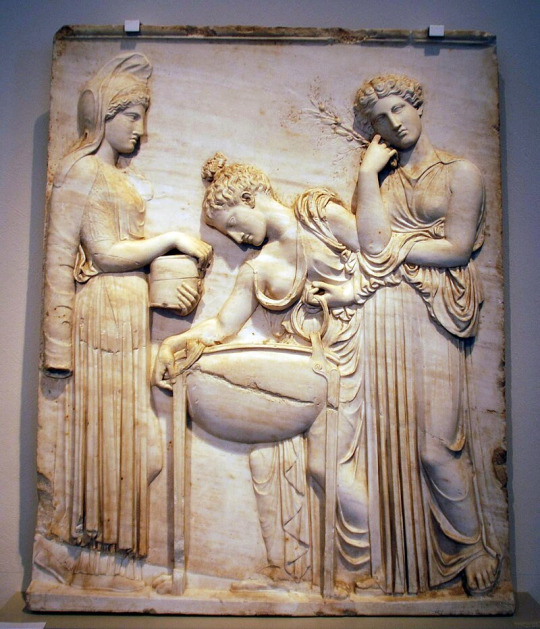
II/ The infanticide
The determining element that shifted the glorious myth to the abominable tragedy is the theme of the infanticide. It appears with the epic poet Eumelos (8th or 7th century BCE) where Medea kills by accident her children in an attempt to give them immortality, by burying them in the sanctuary of Hera (the katakryptia process). But she fails, just like Thetis failed to give immortality to her son Achilles: the children die smothered alive. Medea has good intentions, but commits a bad action. Then, with the epic poet Creophylos (third quarter of the 6th century BCE), Medea is falsely accused by the Corinthians of killing her children, because they want to get revenge on her for the murders of king Creon and the princess Creusa/Glauke. Finally, it is Euripides, in 431, who synthetizes the two versions: he is the first to write that Medea actually and willingly killed her children.
As soon, the new image of Medea is set and fixed: she is a killer of men. She killed her brother Apsyrtos, that she stabbed before cutting him into pieces and throwing them in the sea, to slow down the Colchian pursuers. She killed the father, since he received an oracle telling him he would die by losing the Golden Fleece (according to Diodorus, he died during a night battle between the Colchians and the Argonauts). She killed Pelias, the uncle of her husband, manipulating his daughters into slitting his throat in the hope of bringing him back to life in a magic cauldron. She killed the king of Corinth, Creon, who was guilty of trying to marry Jason to his daughter, and to exile Medea. She killed her children, all boys – and this is the most famous part of her myth. She killed her husband, that she convinces to sleep by the shadow of the Argo, which was rotting on the sand: a piece of it falls and crushed his head. Finally, she is the killer of Perses, Aietes’ brother, who had usurped Colchis’ throne. Only Theseus managed to escape death at her hands in Athens.
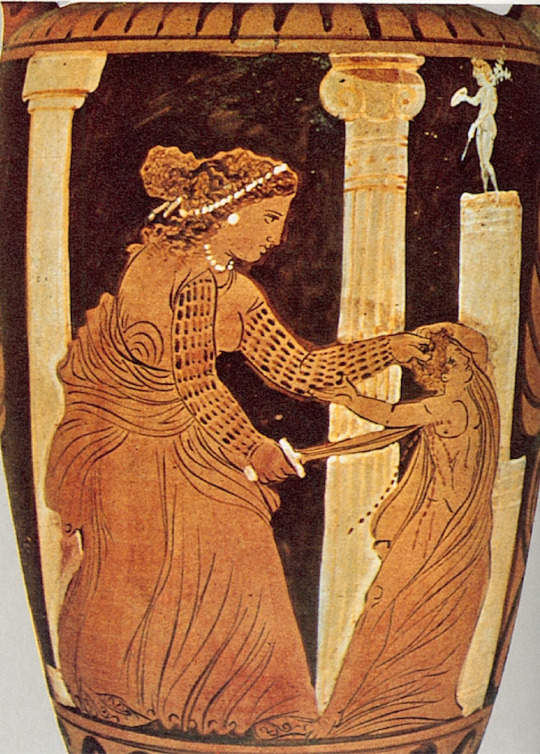
III/ From one myth to another
Euripides is thus the one who completely shifted the myth and turned Medea into this beautiful and dangerous character that imposed herself in literature. By showing, at the end of his play, Medea flying away of the palace on a dragon-tied chariot sent by her grandfather Helios, he gives her back the supernatural nature she had lost by being turned into the princess of Colchis. But the benevolent goddess has been turned into an elemental power, monstrous and maleficent. According to Seneca, the name “Medea” is linked to other words in “m”: “mare” (the sea), “metus” (dread), “malum” (evil), “monstrum” (monster), “Medusa” (the Gorgon). She is also the “mater”, the mother, but a mother who kills her children. The summit of this nefarious power is reached with Dracontius, at the end of the 5th century CE, who tells of how Medea manages to “remove the horns of the full moon”, an immense feat of magic never repeated to this day. Considering this, it is quite surprising to see that Medea now ends her career as the mere wife of Achilles (alongside Helen, Iphigenia, and Polyxene) in either the Elysian Fields or the Blessed Islands. This part of the legend appeared with Ibycos, in the second half of the 6th century BCE, before being repeated by Simonide (556-467 BCE) and finally by Lycophron, an “antiquarian”, that is to say a mythographer who collected the older and more ancient versions of legends, those of a time when Medea was a benevolent entity.
We already saw two of the reasons that explain why Medea the generous goddess becomes the bloodthirsty monster: first, the introduction of a being of the Otherworld into the human world that is the Greek civilization ; second, the evolution of the motif of the infanticide. But there are three other important elements to take into account. First of all being her relationship with Thessaly: Medea is linked to this country through Jason, who is born in Thessaly, and through the city of Ephyra. The Thessalian land was considered to be the country of witches: the Latin poets and writers always had the word “witch” or “sorceress” be followed by the adjective “Thessalian”, and the connotations of witchcraft were almost always negative.
The second element to take into account is Medea’s relationship with the Orient, which also brings us back to witchcraft and magic. It is from the East that Helios rises every day on his chariot, on his journey to the West, and Helios has among his descendants many witches, such as Circe, Pasiphae… or Medea. But above all, the Orient is characterized by cunning, cruelty and barbary, all traits that Medea bears when she tricks the daughters of Pelias, when she lies to Creon and Jason, when she kills and disembowels, when she had the Corinthian princess die in atrocious pain through a drug that burns her like acid. The Barbarian is the invader, like the Medes who had invaded Greece (and whose name was linked to the one of Medea): this is why all the iconographic depictions posterior to 480 BCE (the battle of Salamine) show Theseus the Greek fighting against Medea the Mede.
The third reason for this change of good to evil is that, at least since Euripides, Medea is perceived as a “virile woman”: in a Greek society dominated by men, such a masculine woman is to be a monster. Euripides has her use constantly a military language: she prefers to be “three times on the line, three times with the shield by her side” rather than to “give birth one more time” ; she wants to “do like hoplits”, she wants to use a word, to use strength, she keeps talking about her enemies and her glory. The Athenian, who typically locks up his woman in the gynecea, can’t stand such words.
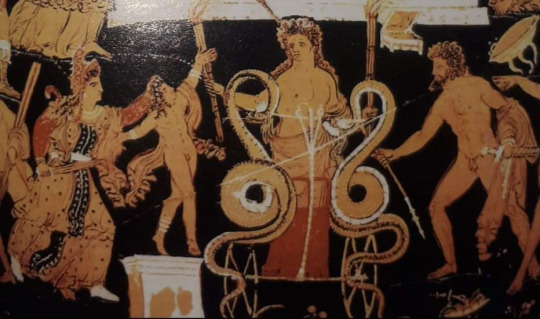
IV/ Terror and pity
Yet, Euripides is a much too talented of a playwright to create just a melodrama character. He uses the two tools of the tragedy, terror and pity. Medea is also the poor young woman abandoned by the one who seduced her, she is alone, far away from her family, of which she cut herself off due to her actions. She is the bronze-skinned foreigner that is disdained and dreaded, and as such she is the perfect scapegoat. She is a being of flesh torn by conflicting feelings, her hatred for Jason, and her love for her children ; children that she turns into tools for her revenge against her cowardly and unfaithful husband, while perfectly knowing that the crime she is about to commit will break not just Jason’s heart, but also her own. This duality is still maintained centuries after Euripides. Most authors of Antiquity (Ovid, Seneca, Dracontius) put a focus on the violence and monstrosity of the character – outside of a few, such as Apollonios of Rhodes or Valerius Flaccus, who rather focus on the birth of Jason’s and Medea’s love. However, modern and contemporary authors are much more nuanced: as such Cherubini, Lamartine, Grillparzer and Legouvé focus on the duality of Medea, putting at the center of their work the idea of this dark-skinned foreigner who is both dreaded and rejected. The picture of Medea as the gypsy woman is central in the works of Anouilh, Max Rouquette and Christa Wolf, who all stay faithful to the themes of the pharmakos and of the scape-goat, already present by Euripides’ work.
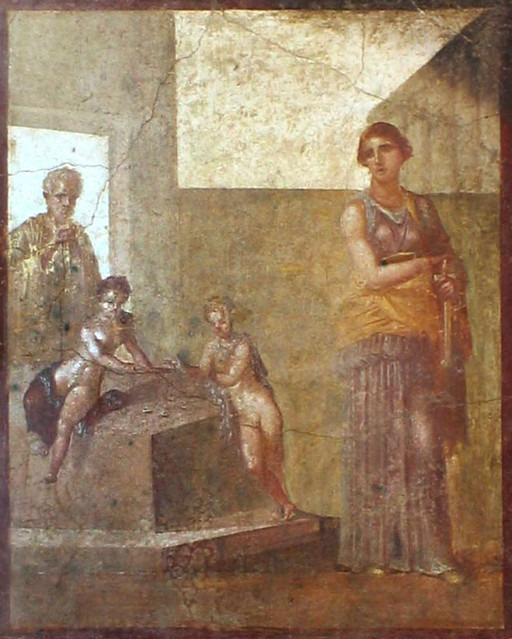
27 notes
·
View notes
Text
Jason as Theseus and Medea as Ariadne:
And Aeson's son [Jason] saw that she had fallen into some heaven-sent calamity, and with soothing words thus addressed her [Medea]: "Why, pray, maiden, dost thou fear me so much, all alone as I am? Never was I one of these idle boasters such as other men are — not even aforetime, when I dwelt in my own country. Wherefore, maiden, be not too much abashed before me, either to enquire whatever thou wilt or to speak thy mind. But since we have met one another with friendly hearts, in a hallowed spot, where it is wrong to sin, speak openly and ask questions, and beguile me not with pleasing words, for at the first thou didst promise thy sister to give me the charms my heart desires. I implore thee by Hecate herself, by thy parents, and by Zeus who holds his guardian hand over strangers and suppliants; I come here to thee both a suppliant and a stranger, bending the knee in my sore need. For without thee and thy sister never shall I prevail in the grievous contest. And to thee will I render thanks hereafter for thy aid, as is right and fitting for men who dwell far oft, making glorious thy name and fame; and the rest of the heroes, returning to Hellas, will spread thy renown and so will the heroes' wives and mothers, who now perhaps are sitting on the shore and making moan for us; their painful affliction thou mightest scatter to the winds. In days past the maiden Ariadne, daughter of Minos, with kindly intent rescued Theseus from grim contests — the maiden whom Pasiphae daughter of Helios bare. But she, when Minos had lulled his wrath to rest, went aboard the ship with him and left her fatherland; and her even the immortal gods loved, and, as a sign in mid-sky, a crown of stars, which men call Ariadne's crown, rolls along all night among the heavenly constellations. So to thee too shall be thanks from the gods, if thou wilt save so mighty an array of chieftains. For surely from thy lovely form thou art like to excel in gentle courtest."
Argonautica, 3.973-1007. Translation by R.C. Seaton.
Ariadne as Jason and Theseus as Medea:
[Jason] You’re [Medea] not a woman. You’re a she-lion. Your nature is more bestial than Scylla, the Tuscan monster.
Euripides' Medea, 1343-1345. Translation by Ian Johnston.
[Ariadne] What lioness whelped you [Theseus] under a desert rock, what sea conceived and spat you from foaming waves, what Syrtis, what fierce Scylla, what vast Charybdis, you who return me this, for the gift of your sweet life?
Catullus 64.154-57. Translation by A.S. Kline.
The Argonautica narrative itself subverts the Theseus-Jason and Ariadne-Medea comparison in many ways, including Medea herself denying that she is like Ariadne, and it's also notable that the words of Cutullus are reminiscent of Patroclus' words to Achilles in Book 16 of The Iliad. I just thought it was interesting that while the Jason-Theseus and Medea-Ariadne parallels are common, I hadn't realized until recently that there was a curious similarity between the words of Jason and Ariadne in Euripides and Cutullus (I read this comparasion in a book or a article, I don't remember). Medea is like Ariadne in that she is a maiden betraying her homeland for a foreign hero, but Ariadne is like Jason in that she was the one who was deceived. Medea/Ariadne accuses Jason/Theseus of disloyalty, but Jason/Ariadne accuses Medea/Theseus of being incapable of empathy.
3 notes
·
View notes
Text
Love blinded fools
On the plains of Attica Medea wanders in search of a new refuge, as she walks a familiar voice fills her mind, “Here you are again, another exile, another attempted murder, I pity you, yet I do not know why, I should hate you more than any other”
Medea replied to what seemed to be her own thoughts “I do not need your pity, I do not regret my choices… Jason.”
A mist wisped in front of her sight, it seemed to come from her own head or right above it, the cloud changed into a humanoid form before gaining the detail of her lover. His body was semi transparent, it was obvious to Medea that this was not him but his spirit.
Medea addressed the specter “What do you want from me? Have you come to take revenge?”
The figure responded “That was my initial plan but I discovered that because of our oaths our souls are chained together, if I were to kill you they would be separated and I would be sent to Tartarus, now to avoid that fate I will keep you alive and protect you from harm.”
Medea smirked, “Is that so?” She chuckled, “That’s your revenge? My dear betrothed always keeping me safe?”
Jason became flustered “Do not mock me vile woman! I will make your pain endless! You will watch all you know fall as you out live all!”
Medea’s grin grew as she spoke “Oh woe is me, what a terrible fate, I’m so sorry for ruining your life after you ruined mine!”
Jason’s blush grew “I can sense your sarcasm, witch! I have no other choice but to do this! I will have my revenge and have you suffer as I have!”
Medea replied “It would seem you are in a worse place than I, tell me son of Aeson, why does your face become red as it did during the times when you thought me your lover? Does some drop of affection still lie in your heart?”
Jason looked away to hide his face from her gaze, “Do not be so coy, I despise you, my face does not become red with love, it is rage!”
Medea grabbed his chin with her fingers and forced him to look into her golden eyes, she spoke with a soft almost flirty voice “I do not believe you, you said yourself you cannot bring yourself to hate me, you want to protect me again because it makes you feel good.” She put on a fake cute voice “Jason my dear savior, you took me away from my barbarian homeland and to beautiful Greece, I thank you my handsome, hero, husband!” Her voice returned to its softness “Is that what you wanted to hear? Did you want me to praise you?”
Jason was too flustered to speak, she was in complete control of him with nothing but her words.
Medea leaned in to whisper in his ear “Do you still love me?”
Jason’s body felt like it was on fire, he whimpered out a response “Yes, I do. I… missed being your hero.”
Medea kissed him and he returned it, whispering to him again after she pulled away. “There’s my hero, I love you too, now that you’re bound to me you can never leave my side for another woman.”
Jason whispered back smiling sheepishly, “I like that, I never want to leave you again, forgive me for what I’ve done, I’m yours.”
She placed her hand on his face and rubbed his cheek with her thumb, he melted at her touch. They smiled into each other’s eyes.
#greek mythology#the accursed series#tagamemnon#writing#medea#the argonauts#jason#jason and medea#jason x medea
5 notes
·
View notes
Text
list of names i use to pick character names!
i scoured several baby names sites years ago and i still use this list to this day if i’m stumped on what to name a character of mine! figured i might as well post it since it might help someone else! feel free to add on ^^
https://parenting.firstcry.com/articles/50-baby-names-that-means-healer-for-girls-and-boys/ (boys?? ig??) Aeson Before Jason, it was Aeson. This variation of name had commanded the hearts and minds of the warriors. Aeson means ‘healer’. Alaunus Alaunus is the name Sun God in Gaulish. It also means prediction, and revenge, which also happens to be related to the Greek god named Apollo. The name Alaunus signifies ‘brightness’. Asa A simple, sober, and scriptural name, Asa, means ‘expert, healer, or an individual born in the morning sun’. This is a uni-sexual name, that sounds equally good on females. Galen Galen is the name of a second-century physician who developed the basis of medicine. Galen means ‘quiet or healer’. Helem Helem, an Israeli word, signifying ‘to dream or to heal’. This name is slowly losing its existence, however if you like sound of it, you can definitely pick it up for your boy. Jayr Jayr, which means ‘healer’, has been used in America since the founding of the provinces, all thanks to the Puritans. Despite being an old name, its a rarely used one. (girls?? ig??) Airmed The name Airmed comes from the Irish mythology. A woman named Airmed was known for her ability to heal people during battle. There goes a folklore that healing herbs sprouted from her tears and healed the body of the injured. Althea This sentimental and ethereal name comes from the Greek folklore and has a peaceful ring to it. Althea implies healing power. Amethyst Amethyst has been utilized in healing and enchantment since time immemorial. As Amethyst is a birthstone from February, it would be best utilized for a young lady from February. Emma Emma, the generally acclaimed name, has numerous takers everywhere throughout the world. So no big surprise individuals decipher it unexpectedly. While its most regular meanings are ‘widespread, complete or whole’, in Teutonic, Emma signifies ‘healer of the universe’. Leigh Leigh has several meanings. In Celtic, Leigh signifies ‘healer’. This name can likewise be spelled as Leigha. It is a unisex name. Reselda Reselda, an enchanting Latin American name, which means healer, is getting a charge out of moderate degrees of utilization in European nations. Sirona The name Sirona belongs to the Celtic healing goddess. In the eastern Gaul, the figure of Sirona appears in carvings near the German sulfur springs. Even its temples are built near the thermal springs and healing wells.
https://baby.lovetoknow.com/wiki/Gothic_Baby_Names Arachne (girl) - Young woman who challenged Athena and was turned into a spider Balor (boy) - One-eyed giant in Irish mythology Griffin/Gryphon (boy) - Mythological beast with the body of a lion and the wings and head of an eagle Isolde (girl) - tragic Irish heroine Moon (unisex) - ancient symbol of fertility (last names) Addams - from the famous show The Addams Family Bara - a noted femme fatale from the 1910s Baudelaire - French poet famous poet from Gothic period in literature Gorey - artist who has a goth aesthetic Mortem - after fashion design Rose Mortem who is married to Goth band frontman from The Awakening Stoker - last name of the writer of Dracula (dark sounding names) Akeldama (boy) - field of blood; where Judas Iscariot committed suicide Dade (boy) - dark one Draven (m) - Child of the shadows Leila (girl) - Arabic for night Mara (girl) - a maleficent female wraith in Scandinavian folklore that causes nightmares Shadow (unisex) - black Shiva (boy) - God of destruction (creepy) Avarice (girl) - greed Badriyah (girl) - full moon Golgotha (unisex) - Hebrew for skull Melancholia (girl) - a mental condition and especially a manic-depressive condition Morte (boy) - French for dead Thorne (unisex) - sharp Vladimir (boy) - alleged vampire Wolfe (boy) - deadly beast (creative gothic names) Ascelin (unisex) - of the moon Aelfwif (boy) - Germanic word for elf + battle or war Alaric (boy) - first king of the Visigoths; means all-powerful ruler Clove (girl) - spice Draconia (girl) - dire Druscilla (girl) - it sounds dark but actually means fruitful Dyrk (boy) - one who admires nighttime Mallory (girl) - cursed or ill-fated one Perdita (girl) - lost in Spanish Quillon (boy) - sword Twilight (girl) - dusk Vespers (unisex) - Catholic evening prayers Xander (boy) - vampire hunter from the television show, Buffy, The Vampire Slayer (nature) Ash (boy) - what's left after a fire Belladonna (girl) - poisonous plant with purple flowers Branwen (boy) - Bran is a Celtic word for crow Briar (boy) - a thorn Chrysanthemum (girl) - flower associated with death in Japan and some European countries Foxglove (girl) - a beautiful but poisonous flower Hellebore (girl) - flower that blooms through the snow in the middle of winter Hemlock (unisex) - poison Socrates took to commit suicide Merula (boy) - Latin for blackbird Oleander (unisex) - a beautiful but poisonous plant Onyx (unisex) - stone that is pitch black Raven (girl) - bird often associated with death Sage (unisex) - a spice Willow (girl) - weeping tree; symbol of death (books) Basil - from The Picture of Dorian Gray by Oscar Wilde Desdemona (girl) - tragic Shakespearean heroine Grendel (boy) - name of the beast from Beowulf Eulalie (girl) - figure from Edgar Allen Poe poem Manfred (boy) - the lord in The Castle of Otranto, a gothic novel by Horace Walpole Nimue (girl) - an Arthurian sorceress Tempest (unisex) - as in by Shakespeare
https://baby.lovetoknow.com/baby-names/celestial-boy-names-related-space-astronomy (galaxy) Baade - last name Burbidge - last name Cygnus - swan Fath - conquest Fornax - furnace Helix - spiral ornament Leo - lion Phoenix - dark red Reinmuth - counsel mind Serpens - the serpent Virgo - young (planet, moon, satelite) Atlas - moon of Saturn; name of a Greek titan who held the heavens on his shoulders Hyperion - moon of Saturn; named for a Greek titan Jovian - name of the system that includes Jupiter, its rings, and its moons Mars - planet name representing the Roman god of war because the planet is red Mond - German word for "moon" Oberon - moon of Uranus; named after the king of the fairies in a Shakespeare play Phobos - one of Mars' moons named after a horse who pulled Roman god Mars' chariot (star and constellation) Alnair - the bright one Aquila - the eagle; constellation Azmidi - unknown Celaeno - the dark one Chertan - two small ribs Dorado - the swordfish; constellation Elgafar - the forgiver Felis - cat Hydrus - the male water snake; constellation Wurren - little fish (astronomers) Asaph (Hall) - discovered the moons of Mars Edwin (Hubble) - American astronomer who created a galaxy classification system Kepler (Johannes) - determined planets traveled around the sun in ellipses Sagan (Carl) - American astronomer who helped popularize astronomy (astronomy terms) Albedo - ratio of reflected light Aphelion - the point where a celestial body is furthest from the sun while orbiting Barlow - type of lens for a telescope Blazar - type of active galaxy Comet - ball of ice and debris orbiting the sun Dob - short for Dobsonian; type of reflector for a telescope Equinox - when day and night are of equal length Phoenix or Phoena (The magical fire bird in Greek mythology. In Greek, Phoenix means "rising bird" and Phoena means "mystical bird" or "purple.") Gibbous - when the moon appears more than half illuminated Meridian - imaginary north-south line Mak - nickname for the Maksutov-Cassegrain telescope Zodiac - set of constellations
https://baby.lovetoknow.com/baby-names/137-magical-girl-names Althea (Greek for "with healing power) Andromeda (In Greek mythology, she became a star. The name means "advising like a man.) Diana (Roman goddess of the hunt and the moon who is often associated with witchcraft and Wiccans. The word means "divine" in Latin.). Holly (English word for a type of plant, the name is often associated with Wicca.) Iris (Greek for "rainbow" and also the name of a flower. Iris was the Greek goddess of the rainbow.) (fairy) Aine (Irish name that means "brightness or splendor." In Celtic folklore, Aine was the queen of the Munster fairies and a goddess of the summer.) Asteria (Greek for "star." She was the goddess of justice. Also known as the "crying fairy.") Calliope (Greek for "beautiful voice.") Devas (Persian/Greek fairies that live in nature and appear as small balls of light, like fireflies.) Mab (Irish for "baby." In Shakespeare's Romeo and Juliet, Mab is the queen of the fairies.) Selkie (In Scottish mythology, Selkie is a name for fairies which means "seal folk" as they had the ability to change into seals and human form at will.) Titania (Greek for "great one" or "giant." Titania was the queen of the fairies in Shakespeare's A Midsummer Night's Dream.) (dark fairy) Agatha (Greek for "good woman." Agatha Harkness is a witch in Marvel comics.) Belinda (German/Spanish word for "pretty one" or "serpent" or "beautiful snake." A goddess of heaven and earth in Babylonian mythology." Ceridwen (Welsh for "beautiful as a poem." A Celtic goddess of poetry and a sorceress in Welsh folklore.) Dahlia (Swedish origin, the name for a flower. A dark witch character in the television show The Originals.) Eris (Greek goddess of discord and strife and a witch in the Maleficent Disney movie.) Koko or Kohko (Algonquin name that means "the night.") Lamia (Evil witch in the book and movie Stardust. A Lamia was a snake with the head and breasts of a human female in Greek mythology.) Melinoë (In Greek mythology, a nymph associated with nightmares and mental illness as well as the moon. She is associated with wearing the color yellow.) Opal (A dark pixie character in the Artemis Fowl series. The word comes from the Sanskrit and is a type of gem.) Tanith (A Phoenician goddess of the moon. Tanith Lee is an acclaimed dark fantasy author.)
(elven) Amberle (Elven princess character from the Shannara series.) Elanor (A Sindarin name that means "sun star.") Siofra (An Irish name that means "fairy" or "elf.") Vila (In Slavic mythology, a type of winged elven race that are beautiful and live in the clouds.) Willow (English origin. A type of tree and also a witch in Buffy the Vampire Slayer.) (witch) Alcina (Greek for "strong willed." A witch from Greek mythology and also an opera by Handel.) Aradia (The "first witch" from the Wiccan work Aradia, or the Gospel of the Witches.) Aurora (Goddess of the dawn in Greek mythology and also the name of Sleeping Beauty in the Disney movies.) Circe (Geek for "bird." Circe was a witch in Greek mythology.) Cirilla or Ciri (A pale-haired sorceress from The Witcher books, video games and television show.) Fleur (French for "flower." Fleur Delacour is a French witch in the Harry Potter series.) Lilith (Asyrrian word for "ghost." Lilith was Adam's first wife in Hebrew mythology who became a demon.) Merlinne or Merlynne (Welsh for "sea fortress." A feminine version of Merlin, the wizard in the story of King Arthur.) Minerva (Latin for "of the mind; intellect." Minerva McGonagall is a witch in the Harry Potter series.) Sabrina (A name of Celtic origin that means "white rose." Also a famous teenage witch on television.) Sadira (Persian for "lotus tree." Sadira is a sand witch in the Aladdin Disney television show.) (mystical) Aisling (Irish name that means "dream or vision.") Amitola (A Native American name that means "rainbow.") Ariadne (A Greek goddess of fertility.) Avalon (The mystical "isle of apples" in Celtic and Arthurian legend.) Celeste or Celestia (Latin for "heavenly.") Epiphany (Greek word that means "revelation" or "revelation of a divine being.") Kachine or Kachina (A "sacred dancer" or "dancing spirit" in southwestern Native American cultures.) Luna (Italian for "moon." Luna was a Roman goddess of the moon.) Maia (Greek for "mother." Maia was the goddess of spring and "mother earth" in Roman mythology.) Merope (Greek for a bird that eats bees. In Greek mythology, one of the seven Pleiades, a group of nymphs who were turned into stars by Zeus. Also Voldemort's mother in the Harry Potter series.) Nokomis or Nakomis (Chippewa name for the daughter or grandmother of the moon.) Seraphina or Serafina (Hebrew for "fiery," Seraphina is based on the seraphim which are angels in Judaism and Christianity. Serafina Pekkala is a witch in the His Dark Materials series.) Ulloriaq (A Native American name that means "star like.") Zorya, Zora or Zarya (A pair of goddesses in Slavic mythology who are the morning star and evening star.)
(mermaid) Acantha (Greek for "thorn." A nymph in Greek mythology). Asrai (A fairy that lives in seas and lakes in English legends. They are associated with the moonlight.) Asterope (A Greek word for "starry face." She was a nymph in Greek mythology.) Clio (Greek for "glory." Cleo was a sea nymph in Greek mythology.) Daphne (Greek for "laurel tree." Daphne was a nymph in Greek mythology.) Kailani or Kailee (Hawaiian for "sea and sky.") Larissa (Greek for "citadel." A nymph in Greek mythology and the name of one of Neptune's moons.) Lorelei (In German folklore, Lorelei was a mermaid who lured sailors to their death in the Rhine River.) Melia (Greek name that means "work." Melia was a nymph in Greek mythology and the daughter of Oceanus.) Narice or Nerissa (Greek for "from the sea." Niamh, Neve, Nieve or Neave (Gaelic for "bright." In Irish folklore, Niamh was the daughter of the sea god.) Ondine (Latin for "little wave." Ondie was a nymph and water spirit in German folklore.) Sereia (Portuguese name that means "mermaid.")
https://baby.lovetoknow.com/baby-names/47-rare-boy-names-that-are-unexpectedly-cool Aero (air-oh) - air Axton - swordsman's stone Asar (ah-sar) - unknown; Greek form of Osiris, God of the Dead Benno - bear Brage (brah-gee)- first Druid (droo-ihd) - strong seer; Ancient Celtic priest or magician Enos (ay-nohss)- man or mortal Kalix - most beautiful Omri (om-ree) - my sheaf Orvar - arrow Osten - stone island Rodion (roh-dee-on) - song of the hero Scion (si-on)- descendent Taft - building site Torin - chief Yudel (yoo-dehl) - praise Zoar (zor) - light or brilliance (Extraordinary and Rare Long Names for Boys) Alderic (ahl-day-reek) - old ruler Benesh - blessed Caishen (ki-shen) - god of wealth Coleman - dove Jacobus (juh-koh-bus) - supplanter Janeiro (juh-nayr-oh) - January Ledger - tribe spear Raiden - thunder and lightning Taranis (tuh-ran-iss) - thunder Tristram (trihss-trum) - riot Whittaker (wit-uh-ker) - white field Yorick - farmer Zhubin (zoo-bihn) - spear-like
(elemental) Aidan (Gaelic) - fire element; fiery Ethereal (English) - air element; extremely delicate Garnet (Middle English) - earth element; dark red gemstone Gale (Middle English) - air element; jovial Rain (American) - water element; abundant blessings River (Latin) - water element; flowing body of water Sky (Old Norse) - air element; cloud Zephyr (Greek) - air element; west wind https://baby.lovetoknow.com/baby-names/graceful-tree-names-girls Apple Ash Aspen Catalpa Cherry Hazel Holly Juniper Laurel Madrone Magnolia Myrtle Poplar Willow Yew (scientific tree inspired) Balsamea - Abies balsamea, or balsam fir Betula - Betula lenta, or black birch Carya - Carya ovata, or shagbark hickory Castanea - Castanea dentata, or American chestnut Celtis - Celtis occidentalis, or common hackberry Cercis - Cercis canadensis, or redbud Gleditsia - Gleditsia triacanthos, or honey locust Ostrya - Ostrya virginiana, or American hophornbean Swietenia - Swietenia mahogoni, or mahogany Taeda - Pinus taeda, or loblolly pine Tilia - Tilia Americana, or American Basswood
(unique/cool) Baylisiana - there is only one Pennantia baylisiana, or Three Kings Kaikomako, left in New Zealand Dentelle - there are only two Bois dentelle, or Lace Wood trees, left in Mauritius Erythrina - coral tree, or Erythrina schliebenii, found in Tanzania Kaikomako - also inspired by the Pennantia baylisiana (Three Kings Kaikomako) in New Zealand Mpingo - African blackwood tree with a purplish hue Pennantia - also inspired by New Zealand's Pennantia baylisiana (Three Kings Kaikomako) Socotra - Socotra dragon tree, also known as Dragon Blood tree, found in Yemen (rare) Auxin - hormones in trees that stimulate cell growth Cambium - the growing part of the tree trunk Chi (Vietnamese) - branch Clematis (English) - twig Crown - the upper part of the tree with the branches Dalia (Hebrew) - hanging branch Lignin - a strong, natural chemical glue that holds the central heartwood of a tree together Ritva (Finnish) - birch branch Verbena - leaves, twigs (meaning tree) Alani (Hawaiian) - orange tree Anargul (Kazakh) - blooming pomegranate tree Ashley (English) - ash tree clearing Björk (Icelandic) - birch tree Eglė (Lithuanian) - spruce tree Elowen (Cornish) - elm tree Fidan (Turkish) - sapling Hadas (Hebrew) - myrtle tree Hadassah (Biblical) - myrtle tree Hollis (English) - holly trees Iva (Slavic) - willow tree Jela (Serbian) - fir tree Kalina (Polish) - viburnum tree Kiri (Maori) - skin of a tree Liepa (Lithuanian) - linden tree Lina (Arabic) - palm tree Lovorka (Croatian) - laurel tree Melia (Greek) - ash tree Moriko (Japanese) - forest child Oihana (Basque) - forest Ornella (Italian) - flowering ash tree Pomona (Roman) - fruit tree Randa (Arabic) - scented tree Taimi (Finnish) - young tree
if anyone has more they’d like to add feel free!
4 notes
·
View notes
Text
Hebe goddess of youth Cupbearer to the Gods (potential topic for the green hat)
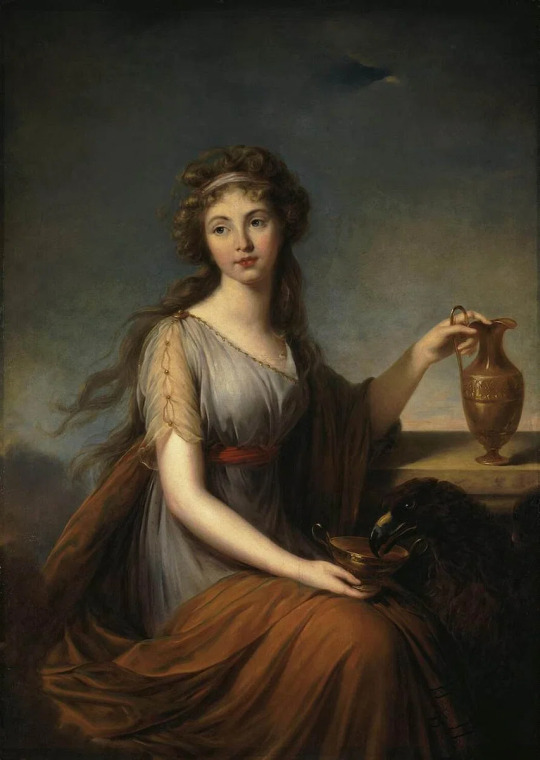
In a way, one can argue that hebe is a solution for aging and her chalice is a method of restoring youth… so like green hat let's go!!!!
Hebe (meaning "youth" or "bloom of youth") is the goddess and personification of eternal youth in Greek mythology. She is the daughter of Zeus and Hera and the wife of the Greek hero Hercules. Hebe serves as the cupbearer for the gods and goddesses of Mount Olympus, and she has the gift of restoring youth to mortals.
HEBE SERVED THE DEITIES OF MOUNT OLYMPUS WITH WINE, NECTAR & AMBROSIA IN GOLDEN GOBLETS.
Although Hebe was the daughter of the king and queen of the gods, she was given the role of cupbearer to the immortals. Her role is in line with ancient patriarchal customs, where the females in the home assisted with serving guests. She served the deities of Mount Olympus with wine, nectar, and ambrosia in golden goblets. In the Iliad, Homer mentions that Hebe served wine to the gods as they watched the battle between Menelaus and Paris.
Hebe's time as cupbearer to the gods came to an end after she experienced a moment of ungracefulness and slipped while serving the gods. Zeus immediately dismissed her from her role and replaced her with the Trojan youth Ganymede, considered the most beautiful mortal by Zeus. Naturally, Hera was angered by her daughter's dismissal and her husband's affection for Ganymede. Annoyed by her anger, Zeus only continued to show his love for the youth by setting Ganymede's image among the stars as Aquarius, the water-bearer.
Other sources state that Hebe stopped being the cupbearer to the gods when she married Hercules. Early on, Hebe was known as Ganymeda, which suggests that this deity was split into two – the male Ganymede, who carried on the job of cupbearer to the gods, while Hebe became a wife to Hercules and a mother to their two sons.
AS THE GODDESS OF YOUTH, HEBE HAD THE POWER TO RESTORE YOUTH TO MORTALS.
As the goddess of youth, Hebe had the power to restore youth to mortals. The ancient Greeks viewed her as being brave and generous. Philostratus of Lemnos (190-230 CE) writes that Hebe was the youngest of the gods and the most loved. According to him, Hebe is the reason why the Olympian gods are eternally young. Hebe's power is touched on in a few myths, which are retold in Ovid's (43 BCE to 17 CE) Metamorphoses.
The Greek hero Jason pleaded with his sorceress wife, Medea, to take years off his life and give them to his ailing, elderly father, Aeson, so that he may live longer. Medea refused to do this, not able to face taking years off her husband's life. Instead, she told Jason that she would ask Hecate for help. Medea and her dragons roamed the Earth for nine days, collecting herbs of renewal. She built two altars of green turf, one dedicated to Hecate and the other dedicated to Hebe. She invoked the sorceress and goddess of youth for help. Sure enough, with their help, Medea was able to restore Aeson's youth.
Hercules asked his wife to bestow the gift of youth to his dear friend and nephew, Iolaus, so he could take revenge on King Eurystheus for the hardship he had put Hercules, Iolaus, and their families through. Hebe agreed and gave Iolaus his youth back, but then swore that she would never use her gift on anyone else. However, Themis, the goddess of justice and divine law, stopped her from making that promise and reminded her of the Theban civil war taking place.
Themis prophecized that Callirhoe, daughter of the river god Achelous, would beg for Zeus to add the years that Iolaus had lost to her own young sons so that they could avenge their father. Hebe's gift would therefore be granted through Zeus' intervention. The gods were not happy that others would be given the gift of youth, and each one put forward someone they had in mind to receive Hebe's gift.
3 notes
·
View notes
Text
Sharp
Your love is like a needle
Source of addiction and depredation, depraved about you
Paved about you pathways to varieties of demises
The miser Mike has become stranger
Your love now something needful
Essential affection, by conviction a conniver I will court and don your attentions
Your abstention from me abhorrent, seedless like an old torrent my barren ballsack
My poems thrive like flies on overripe fruit, rotting on the bough
Eve of battle on deck near the bow rutting sailors, gums sails gusted cheeks and empty scabbards flapping
That you know that I know that you know makes us evil
Printing our deceitful spirals, circling like forest rivals though together thriving
Flimsy centres, nature of bond to splinter, nature of suture to sunder, strength to surrender
Partners are for dancing, any more spoils the broth, where stood His brother when Rome’s raising finally ended?
Your love is like a needle
Hates me and when I grow deflates me
Embraces me lovingly but despising sizes me up for coffin
Bullhorn like Helm Hammerhand’s redresses my routed ranks
Pretending I don’t own you, both of us; scenes seen before Iolcus at Thessaly
I would die before being killed, Aeson father of Jason recognize his Pelias.
Your love needles me
Ensures whatever I do is wrong.
0 notes
Text
Ah Atalanta is warrior and I love her very much, but honestly I think she is holding herself incredibly well given the opponent because opposition is pretty much, well:
Poison Medea used on Glauce started a nightmarish fire that consumed not only Glauce and Creon to the bone, but spread and devoured entire palace and city/kingdom of Corinth. Sometimes fire is described as impossible to put out with water, and behaving like living things, spreading and devouring whatever it finds ( Euripides, Medea; Seneca the Younger, Medea)
Ability to raise dead, specifically she is noted to be able to resurrect dead even younger, stronger, healthier and beautiful than they were in life, as she does with a ram and even her own father-in-law Aeson. This is why Jason's cousins, Pelias's daughters, murder their father, as they think Medea will do same to him (Ovid's Metamorphoses, and several other sources I can't recall now sorry)
As noted above, Medea helps Jason fulfill one task her father sets by making him invulnerable to the fire, which is motif mentioned and presented in pretty much every source mentioning Jason's labors
Sometimes she is described as yoking fiery bulls and controlling, enthralling and putting to the sleep or outright killing Colchian dragon by herself ( Propertius, Elegies; Ovid, Heroides; Diodorus Siculus, Library of History)
Another of guardians of the Golden Fleece is Talos, immortal bronze giant either created as Hephaestus, or last survivor of the mythical Bronze Age that came before Heroic Age of Greek myths and was finished with world flood. While in some versions Medea tricks him in dying with words, in some she either drives him to madness and suicide, or kills him outright, by malevolent magic of evil eye (Apollonius Rhodius, Argonautica)
She is sometimes attributed incredibly potent powers of summoning other creatures and entities to her assistance. This ranges from summoning hordes of venomous serpents, over monsters such as Hydra and Sirens, and divine chariot pulled by dragons of Helios, to outright calling up chthonic deities such as Keres (goddesses of violent death, sisters of Thanatos and sometimes counterparts to Fates) or invoking Furies (goddesses of retribution and punishment (Euripides, Medea; Seneca the Younger, Medea; Apollonius Rhodius, Argonautica)
She is also sometimes attributed power to greatly control elements, weather and nature, to the point of disturbing order of seasons and freezing blossoming land in summer, and also creating bountiful harvest within winter ( Seneca the Younger, Medea)
She is very often attributed the famous power of Thessalian witches, to cause eclipse by drawing Moon down to Earth and holding it captive; Medea's powers however are extended to the point that she is said to be capable of commanding and halting the stars too, and even controlling and drawing down and imprisoning the Sun itself (Ovid, Metamorphoses; Ovid, Heroides; Seneca the Younger, Medea; Valerius Flaccus, Argonautica)
This last one is very important, as Sun and Moon are gods Selene and Helios, and Medea's magic works by overpowering, binding and compelling the gods themselves, which is even more striking since Helios is her grandfather and thus supposed to be her superior and source of her power.
I love Atalanta though I will be open and admit that Medea is my one and supreme favourite haha; and I do think that Atalanta has advantage of superior physical prowess, but I do think that she is holding out very well when faced with opponent whose abilities include mind control, making people die or commit suicide from distance, resurrection, achieve invulnerability to fire ( and possibly other damages such as stabbing and steel), wide scale weather and element control, binding gods and controlling and moving celestial bodies; without even taking in account Medea's penchant for trickery and cruel violent comebacks, she has deck bit stacked against her.
Of course, given how Atalanta's main requirement for marriage was to have somebody beat her and she does not seem to consider trickery cheating, this may end very well, very passionately.
Sorry if I am bothering with this!
Ancient Woman Thunderdome 2023
FINAL ROUND (Round 6): Atalanta vs. Medea!
The rules: Vote based on who would win in a fight, NOT who you like more. Consider factors such as physical prowess, intelligence or cunning, and magical ability.
If the character has multiple non-godly forms, consider the one you believe to be more powerful. If the character is a goddess for a portion of their life, please only consider their mortal or non-godly form.
The fighters:
Fighter: Atalanta Source(s): Apollodorus's Library, Ovid's Metamorphoses, various other mythological sources Bio: Atalanta was a huntress associated with Artemis. She was a virgin who lived in the wilderness, and at one point killed two centaurs who tried to rape her. She may or may not have sailed and fought with the Argonauts, and defeated Peleus in a wrestling match at Pelias's funeral games. When Artemis sent a boar to Calydon to punish the king for not sacrificing to her, Atalanta joined the hunt and drew first blood. Later, her father found her and tried to get her to marry. Atalanta, knowing she was faster than just about anyone, said she would marry anyone who could beat her in a footrace, but if the suitor lost, he would be killed. Many men were killed, until Hippomenes prayed to Aphrodite and received three golden apples, which he threw to the side during the race to distract her. She did marry him, and, after she bore his child, they were both turned into lions in retaliation for having sex in a sacred area.
Fighter: Medea Source(s): Apollonius of Rhodes' Argonautica, Euripides' Medea, various other mythological sources Bio: Medea was a sorceress from Colchis, where the golden fleece was housed. When Jason arrived in pursuit of the fleece, Hera wanted to help him, so she got Aphrodite to make Medea fall in love with him because she knew Medea had skills that would be useful. Medea did help, in exchange for Jason's hand in marriage: she used her magic and knowledge to protect him through the tasks the king had him complete to get the golden fleece, and then when it turned out the king didn't plan to give Jason the fleece, Medea put the dragon guarding the fleece to sleep while Jason stole it. She then joined Jason and the Argonauts in flight. When the Argo was caught by Medea's half-brother, Apsyrtus, Medea tricked him into a trap so Jason could kill him. When they returned from their voyage, Jason was meant to trade the golden fleece for the king Pelias's throne, but he wouldn't give up the throne; Medea then tricked his daughters into killing him by telling them that if they cut him into pieces, she could bring him back to life. From there, she and Jason fled to Corinth, where they lived for some time before Jason decided he wanted to marry another woman, Glauce, the daughter of the king (Creon). Creon exiled her, and so Medea went to Athens and got Aegeus, the king there, to let her stay. She then called Jason to her, apologized for her reaction to his desire to marry someone else, and asked if her children could give Glauce gifts as an apology. The gifts, a robe and crown, were poisoned, and killed not only Glauce but also Creon when he tried to save her. She then killed both her children in an attempt to hurt Jason.
#I admit I am biased#Medea is my lifelong obsession and hyperfixation haha#I also have to be fair and say that some version do mention that Medea's magic depends on rituals and potions#so then her outcome would probably depend on how much preparation time she has#but if all these powers are instant than ooof#I do think that gay sex is best ending haha
110 notes
·
View notes
Text
and now i’m at the final episode of season 1!
hercules has been getting on my last nerve this entire season, but his speech about how jason shouldn’t sacrifice himself just to die like a hero, and how the 3 of them will save ariadne or die fighting is the absolute best. iconic.
i don’t know his name, but the soldier who comes in pointing a sword at pythagoras only to dramatically reveal where his true loyalties lie is my new favourite minor character
i love the ongoing conflict between pasiphae and the oracle, but god it makes me wish the sister relationship between pasiphae & circe had been explored in like... literally any depth whatsoever, imagine how complex and fascinating it would have been. instead we just have circe wanting pasiphae dead and then getting herself killed. and that’s it.
the bull!! i remember this now and as horrifying as it is, i have to agree with pythagoras, it’s kind of amazing
i really had myself convinced that this show was gonna wait until season 2 to resolve the mystery of jason’s dad, but of course they didn’t do that, and now he knows he’s jason’s dad but jason himself doesn’t even know, and i am not emotionally prepared for the reveal
it’s no surprise whatsoever that heptarian miraculously survived getting stabbed in the chest, but in my AU version of the show he dies right there in the mines, taken down by an unnamed leper. just what he deserves.
no but the fucking DRAMA of it all, imagine going to hunt down your stepdaughter and her interfering friends, you manage to capture her boyfriend, only for your ex-husband of all people to wander out of the trees and tell you that the boy is in fact your son. and then, your current husband who’s supposed to be dying is in fact no longer dying. there’s never a dull day in pasiphae’s life
#bbc atlantis#i'm wondering now if aeson returns in season 2 because i feel like the only scenes i remember him from#are ones that didn't happen in this episode#unless my brain is just making shit up to confuse me#but now jason doesn't even know who either of his parents are!#which makes me wonder what he's been told about his mum because i can't remember if he mentioned her in episode 1#he's going to be getting one hell of a shock later!#think you're getting one parent reveal but surprise! there are TWO parent reveals!#one you'll probably be pleased to hear and the other just downright traumatic
22 notes
·
View notes
Text

@ardenssolis replied ; Amg you know -- the last image with Jason looks like wings


/ U KNOW WHAT- I absolutely did not notice that- and now that u mention it, i can’t unsee it ! so i’ll proceed to now overthink about it and give some sort of semblance for a meaning behind it (which holds no spoilers bc i myself have not read through this l.b yet) BUT BASICALLY IM THINKING;; wings and 2 possible symbolisms I could tie with Jason and why the spilled blood could have taken the shape of wings;
1. Golden-woolled winged ram; the initial gist over why Jason embarks on this big adventure starts bc Jason’s uncle (Pelias) killed Jason’s dad (Aeson) and usurped the throne (that originally belonged to Jason’s dad and therefore makes Jason the heir of it) but Pelias will only surrender his kingship to Jason if he retrieves this special fleece from a golden-woolled winged ram called chrysomallos, who’s wool ends up in Medea’s father’ (Aeetes) hands. Many depictions show it as simply a golden-woolled ram (like the statue of Medea down below) but he has wings!
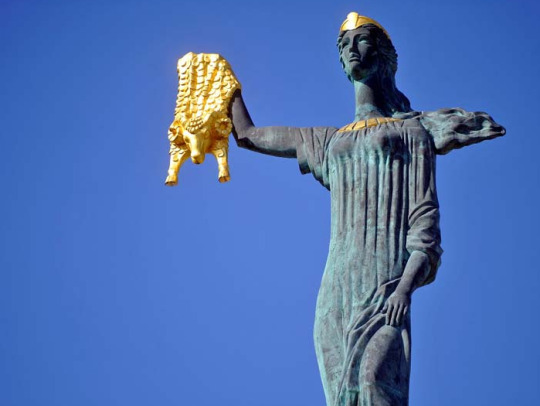
2. Athena; some sources differ on this but it happens to be that whoever ends up planning/constructing the Argo (Jason’s ship) receives the help and/or is made with the help of Athena; Athena in the third book of the Odyssey takes the form of a sea-eagle and is said that on early times presented herself as either an owl or as a bird goddess in general, so once again, the topic of wings pops in (also a curious thing i read; some aspects of the cult of Athena seem to have been influenced by other goddesses such as Ishtar and Anat, whom both carry the symbolism of wings). Without Athena’s help, there would be no Argo, so she is of vital importance indeed !
something else that popped inside my mind (3?). Something about Jason’s hair looking like the color of gold and the color of the winged ram's wool’s being gold; something about how the fleece is a symbol of authority and kingship; how despite him being the rightful heir to the throne, it would be bringing this fleece to Pelias what would would serve to actually prove that he is worthy of being a king,,, something along those lines,, i’m sure that with some further cooking, there would be something taken from this -nods-
#;ooc#ooc#;j.ason#;headcanons#SOMETHING ABOUT;; the hero being destroyed by their own hubris-#j.ason dying from getting crushed by a rotting piece of the a.rgo falling on him#after all that work and bringing back the golden fleece; u end up getting killed like that;#(and another separated point that i find interesting about his story is just how seemingly 'un-heroic' j.ason's death is)#(but im not gonna ramble about that naow heho)#SOMETHING- i wish i could cook the thought more but there was something going on inside my mind that i cant quite put into words rn RIP#now this is all about j.ason's story and not really l.b j.ason's story bc#i dont know the circumstances that lead to him ending up like that#but in any case;; THE POINT IS;; wings are symbolically tied to j.ason#now whether that was on purpose or not; who knows; but it would be a neat detail!#headcanons
3 notes
·
View notes
Text
An Introduction to Worshipping Medeia
As a Hellenic witch, the worship of Medeia is an important part of my practice. She was a witch and priestess of Hekate, possessing nearly unparalleled knowledge of magic and poisons. I wanted to write this post to give some background on who Medeia is, her role as a witch and a priestess, and how I have come to honor her in my practice.
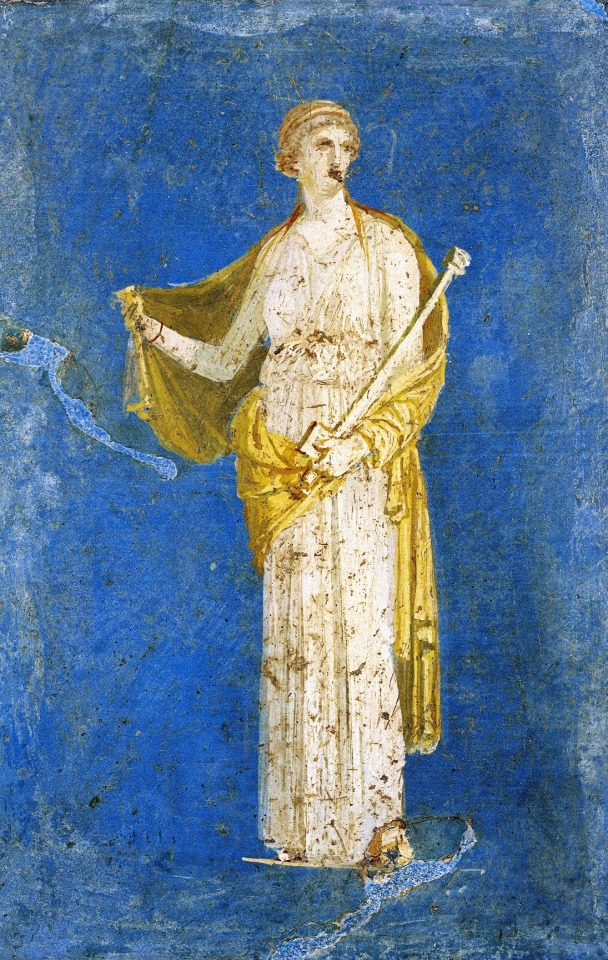
Who is Medeia?
Parentage
Medeia (Μήδεια) is given mainly two parentages, either Aeetes, son of Helios, and Eidyia, daughter of Oceanus, or Hekate and Aeetes. Hesiod offers us a description of the first, writing:
“To the tireless Sun the renowned Oceanid Perseïs bore Circe and King Aeetes. Aeetes, son of the Sun who makes light for mortals, married by the gods’ design another daughter of Oceanus the unending river, fair-cheeked Idyia; and she bore him the trim-ankled Medea, surrendering in intimacy through golden Aphrodite” (Hesiod 31)
Alternatively, Diodorus names Hekate and Aeetes as her parents, explaining:
“Perses had a daughter, Hecate, and she excelled her father in her brazen lawlessness...She was a keen contriver of mixtures of deadly drugs [pharmaka], and she discovered the so-called aconite. She tested the powers of each drug by mixing it into the food given to strangers...After this she married Aeetes and gave birth to two daughters, Circe and Medea, and also a son Aigialeus” (qtd. in Ogden 78)
Either of these parentages could make sense, but I personally observe the first.
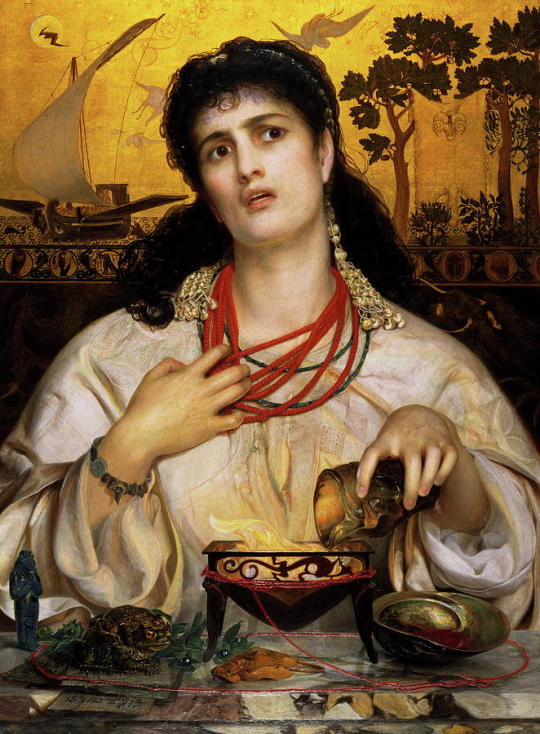
(Art: Medea by Frederick Sandys)
Medeia as the Witch Priestess of Hekate
One of Medeia’s most important roles in literature and myth is that she is a priestess of Hekate and a witch, being called “Medea of the many spells” (Apollonius of Rhodes 109). In most literature there is no way to separate these roles.
She was extremely devoted to Hekate, Apollonius of Rhodes stating that “as a rule she did not spend her time at home, but was busy all day in the temple of Hecate, of whom she was priestess” (116). Euripides also writes that Medea says “I swear it by her, my mistress, whom most I honor and have chosen as partner, Hecate, who dwells in the recesses of my hearth” (Euripides 13). Clearly, the relationship between her and Hekate was very close, and it was said on occasion that she even learned magic from Hekate, Herself. Apollonius of Rhodes writes that “[t]here is a girl living in Aeetes’ palace whom the goddess Hecate has taught to handle with extraordinary skill all the magic herbs that grow on dry land or in running water” (123). Diodorus also claims this, but adds an interesting addendum that attributes to the character of Medeia:
“They report that Medea learned all the powers of drugs from her mother [Hekate] and her sister [Kirke], but her own inclination was the opposite. For she continually saved the strangers that put in from dangers” (qtd. in Ogden 79)
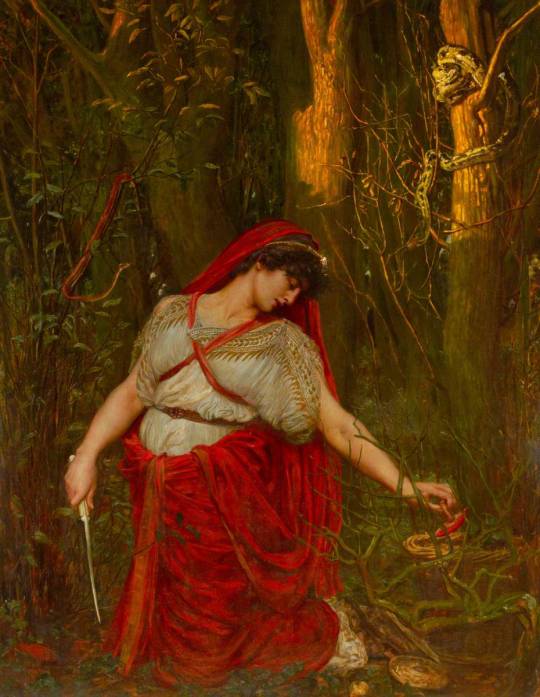
(Art: Medea the Sorceress by Valentine Cameron Prinsep)
Regardless of the origins of her powers, they were no doubt incredible. Apollonius of Rhodes explains that “she can put out a raging fire, she can stop rivers as they roar in spate, arrest a star, and check the movement of the sacred moon” (123). In one instance Apollonius states that “the beautiful Medea spell through the palace, and for her the very doors responding to her hasty incantations swung open of their own accord...From there she meant to reach the temple. She knew the road well enough, having often roamed in that direction searching for corpses and noxious roots, as witches do” (148). This is clearly an indicator that her powers are incredible, but what is even more awe-inspiring is what Apollonius says happens next:
“Rising from the distant east, the Lady Moon [Selene], Titanian goddess, saw the girl wandering distraught, and in wicked glee said to herself: ’So I am not the only one to go astray for love, I that burn for beautiful Endymion and seek him in the Latmian cave. How many times, when I was bent on love, have you disorbed me with your incantations, making the night moonless so that you may practice your beloved witchcraft undisturbed!” (148).
Medeia is said to be able to actually banish the moon Herself from the sky, an unimaginable feat. This is indicative of the degree of power she possesses, having sway over nature itself.
She is most known to have used her knowledge and powers repeatedly to help Jason, her husband, on his quest for the Golden Fleece. The first instance of this was that she made Jason an ointment which would make him invincible. Apollonius describes this in length, writing that:
“She had twelve maids, young as herself and all unmarried...She called them now and told them to yoke the mules to her carriage at once, as she wished them to drive to the spending Temple of Hecate; and while they were getting the carriage ready she took a magic ointment form her box. This salve was named after Prometheus. A man had only to smear it on his body, after procreating the only-begotten Maiden [Hekate] with a midnight offering, to become invulnerable by sword or fire” (131-2)
He continues, detailing the ritual of how she obtained the plant she used to make this ointment:
“Medea, clothed in black, in the gloom of night, had drawn off this juice in a Caspian shell after bathing in seven perennial streams and calling seven times on Brimo, nurse of youth, Brimo, night-wanderer of the underworld, Queen of the dead. The dark earth shook and rumbled underneath the Titan root when it was cute, and Prometheus himself groaned in the anguish of his soul” (132).
Here we see a process that is depicted often, the bathing of Medeia and her ritualistic harvesting of herbs. We also see her here call on Brimo (Βριμω), an epithet of Hekate, in Her role as nurse of the young (Kourotrophos/Κουροτρόφος), night-wanderer (Νυκτιπολος/Nyktipolos), of the Underworld (Χθονιη/Kthonia), and Queen of the Dead (Ανασσα ενεροι/Anassa Eneroi), indicating the importance of Hekate to her witchcraft.
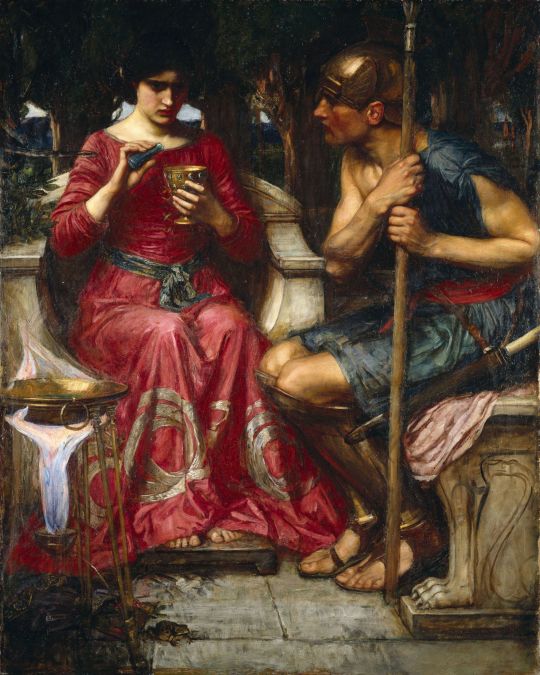
(Art: Jason and Medea by John William Waterhouse)
A similar harvesting of herbs and roots is seen in fragments of Sophocles’ play The Root-Cutters. What we have of the play states that “She [Medea] covers her eyes with her hand and collects up the white-clouded juice that drips from the cut in bronze jars...the covered chests conceal the roots, which this woman reaped, naked, with bronze sickles, while crying out and howling” (qtd. in Ogden 83). Hekate is then said to be “crowned with oak branches and snakes” (qtd. in Ogden 83). Then the women chant “Lord of the sun and holy fire [Helios], sword of Hecate of the roads, which she carries over Olympus as she attends and as she traverses the sacred crossroads of the land, crowned with oak and the woven coils of snakes, falling on her shoulders” (qtd. in Ogden 83). In this short but incredible fragment we see that Medeia calls on both Hekate and Helios, her grandfather, to bless their ritual. We also see a repeat of incantations to harvest magical herbs, and an introduction of her association with bronze.
Another one of Medea’s feats was charming the snake that guarded the Golden Fleece into a slumber. In the Argonautica, Apollonius of Rhodes writes:
“The monster in his sheath of horny scares rolled forward his interminable coils, like the eddies of black smoke that spring from smoldering logs...But as he writhed he saw the maiden take her stand, and heard her in sweet voices invoking Sleep [Hypnos], the conqueror of the gods, to charm him. She also called on the night-wandering queen of the world below [Hekate] to countenance her efforts...the giant snake, enchanted by her song, was soon relaxing the whole length of his serrated spine and smoothing out his multitudinous undulations...Yet his grim head still hovered over them and the cruel jaws threatened to snap them up. But Medea, chanting a spell, dipped a fresh sprig of juniper in her brew and sprinkled his eyes with her most potent drugs and as the all-pervading magic scent spread around his head, sleep fell on him.” (150-1).
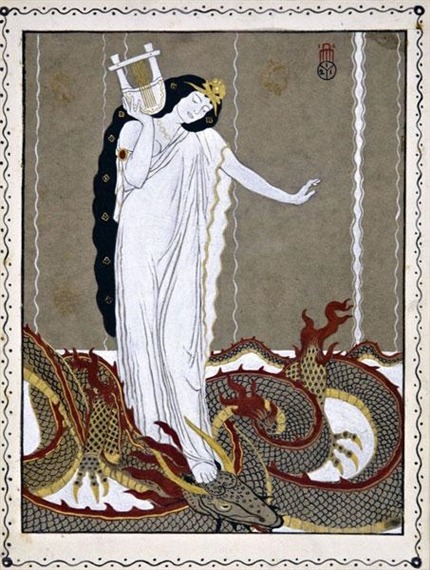
(Medea and the Dragon by Maxwell Ashby Armfield)
She was also said to have killed the giant Talos, a gift given to Zeus from Hephaistos, with her witchcraft, specifically the Evil Eye. In this more horrifying passage, it is said that:
“[W]ith incantations, she invoked the Sprits of Death [Keres], the swift hounds of Hades who feed on souls and haunt the lower air to pounce on living men. She sank to her knees and called upon them three times in song, three times with spoken prayers. She steeled herself with their malignity and bewitched the eyes of Talos with the evil in her own. She flung at him the full force of her malevolence, and in an ecstasy of rage she plied him with images of death” (Apollonius of Rhodes 192).
In this passage, she calls on the Keres, and with them is able to use the evil eye to bring immediate death to a direct creation of the gods. This is a horrifying feat, not only for the power it must require, but for her ability to kill in an instant.
Finally, she also is said to have rejuvenated Jason’s father Aeson. In Ovid’s Metamorphoses, Jason pleads with Medea to take years of his own life to give more to his father, but she rejects him saying that Hekate will not allow such a thing to take place. Instead, she offers that through her witchcraft, instead, if Hekate is willing to help her, she may rejuvenate him. Under the full moon, Medeia performs the ritual. She calls on Hekate, Night, the Moon, and Helios to aid her in her task (126-7). A chariot drawn by dragons appears to her and she takes it to gather herbs harvested with her bronze scythe. After nine days and nights, she returns to Jason to perform the ritual. The ritual is extensive and is essentially repeated in full. She builds two altars, one to Hecate and one to Hebe. She also digs two ditches on sacrifices a black sheep into the ditches, also pouring wine and milk into them. She also calls on the “deities of the earth” which may mean deities of the land or chthonic deities, and Hades. Once she appeases these gods and goddesses, she spells Aeson to sleep on a bed of herbs and tells Jason to leave her to perform her magic. She then dips sticks into pools of blood and lights them with the flames on the altars, then purifying the man once with fire, three times with water, and three times with sulfur.
She then adds many herbs, roots, and flowers to her bronze cauldron as well as “hoar frost gathered under the full moon, the wings of the uncanny screech owl with the flesh as well, and the entrails of a werewolf which has the power of changing its wild-beast features into a man’s. There also in the pot is the scaly skin of a slender Cinyphian water-snake, the liver of a long-lived stag, to which she also adds eggs and the head of a crow nine generations old” (Ovid 129). Then, she slits the throat of Aeson and replaced his blood with her potion, finally rejuvenating him.
There is more descriptions of Medeia’s magical feats throughout literature, but these are simply some of the most detailed and famous. She is clearly a very powerful witch and a significant figure within the history of Hekate worship. With her bronze cauldron and chariot of dragons, she is quite awe-inspiring.
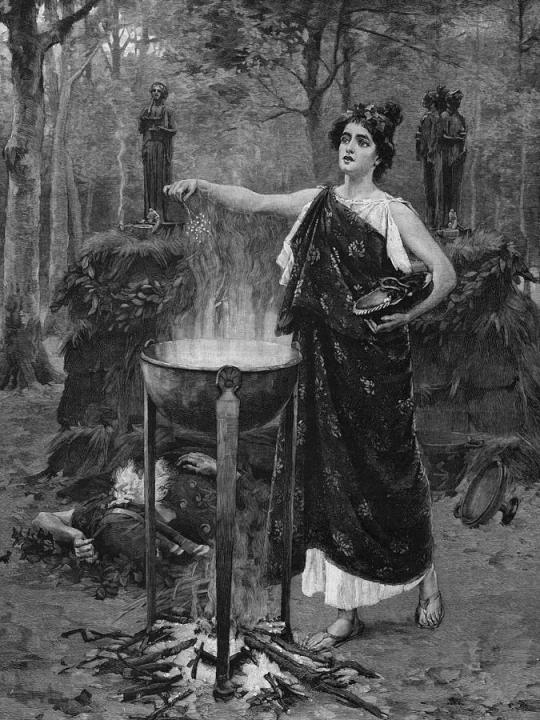
(Art: The Sorceress by R. Willis Maddox)
Medeia’s Character
One of the issues we run into with Medeia’s mythos is her defamation and portrayal as a child-murdering and vengeful woman. She is indeed vengeful against Jason, and rightfully so, for he bade her to leave her homeland, murder her brother, and constantly had her aid him with her witchcraft, only to abandon her for another. However, Euripides’ tale of her brutally murdering her children has some criticisms from scholars who note that there are other versions of the tale.
One such tale is that from Apollodorus who writes that “Another tradition is that on her flight she left behind her children, who were still infants, setting them as suppliants on the altar of Hera of the Height; but the Corinthians removed them and wounded them to death” (1.9.28). In the modern era, a scholar named Sarah Illes Johnston, author of Restless Dead and Hekate Soteira, also writes that Medea prays to Hera Akraia to make her children immortal, and Hera either declines or breaks her promise to fulfill this task, leaving the children to die (62-3). Johnston denies the implication of Medea in her children’s death, instead attributing it to circumstances outside her control or by the hand of another.
These different tellings of Medeia’s story fits with the Colchian princess who aids Jason in a much more believable way than the suddenly spiteful women who murders her children. This variation is less popular, the other being popularized perhaps to demonize magic and women of power.
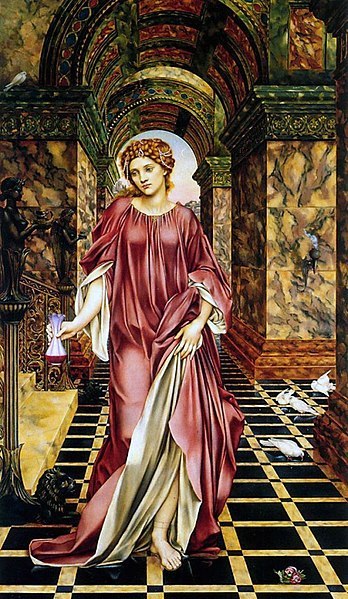
(Art: Medea by Eve De Morgan)
Worshipping Medeia
Now that Medeia’s character and mythological status has been discussed, I think it’s important to talk about how I actually go about worshipping Medeia. I worship Medeia in both divine and ancestral ways, which I suppose could be attributed to methods of hero worship in Ancient Greece. Worshipping Medeia can be done alongside Hekate and/or Helios, as well as alongside Kirke. If you observe the Mighty Dead or Witch Ancestors, she could also be worshipped alongside them.
Offerings
Offerings for Medeia can include wine, frankincense, milk, honey, food, poisons, sacred plants, bronze artifacts, candles, snake parts or figurines and dragon figurines, artifacts of witchcraft, and even Hekate iconography. One could also offer her blood, but that is up to your personal discretion.
Names and Epithets
Names/epithets I call Medeia include ‘Of the Many Spells,’ ‘Vengeful Maiden,’ ‘Witch Priestess of Hekate,’ ‘Medea of Poisons,’ ’She Who Knows All Herbs,’ ‘Giant-Slayer,’ one that could also be said of Hekate, ‘Princess of Colchis,’ ‘Granddaughter of Helios,’ ’Daughter of Sun and Moon,’ one I use to indicate her relationship to Helios and her devotion to Hekate, and Medea Pharmakeia, or Medeia of Witchcraft/Magic.
Sacred Objects
Sacred plants of Medeia could include any poisons, juniper, olive, and aconite specifically. Sacred animals include dragons and snakes. Bronze is also sacred to Medea, as are cauldrons of any kind.
Specializations
Medeia can be called upon for justice and vengeance, especially for spells of justice and vengeance, witchcraft of any kind, to bless herbs, for gardening, for aid in Hekate worship, for the downfall of your enemies, for protection from harm, for protection from snakes, and for guidance in magic.
Prayers to Medeia
Prayer for Medea’s Aid in Witchcraft
Prayer to Medea for Vengeance
Conclusion
In conclusion, while Medeia may not be a part of the usual canon of hero worship, or worship in general, if you are a devotee of Hekate or Helios, worshipping Medeia might be right for you. Likewise, any witch who observes the Hellenic pantheon should give serious thought to venerating Medeia in their practice.
Works Cited:
Medea by Euripides
Magic, Witchcraft, and Ghosts in the Ancient Greek and Roman Worlds by Daniel Ogden
The Voyage of Argo by Apollonius of Rhodes
Theogony by Hesiod
The Library by Apollodorus
The Metamorphoses by Ovid
“Corinthian Medea and the Cult of Hera Akraia” by Sarah Illes Johnston
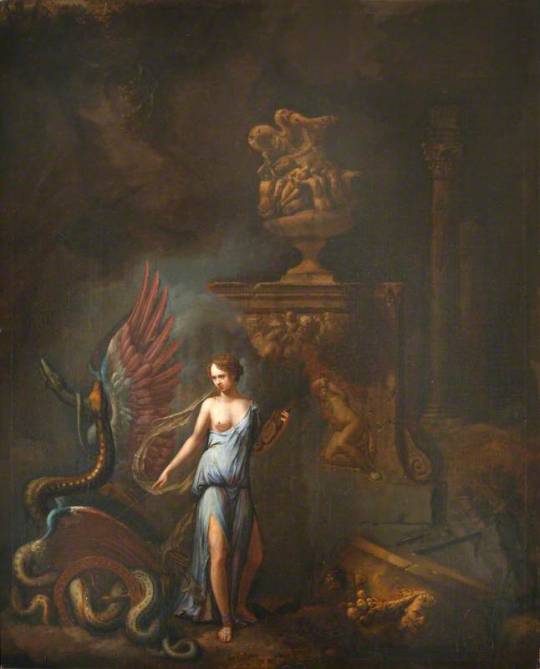
(Art: Medea Casting Spells by Henry Ferguson)
#Medea#Medea worship#hellenic polytheism#hero worship#witchcraft#witch#paganism#Hekate#hecate#hellenic witchcraft#hellenic heroes
2K notes
·
View notes